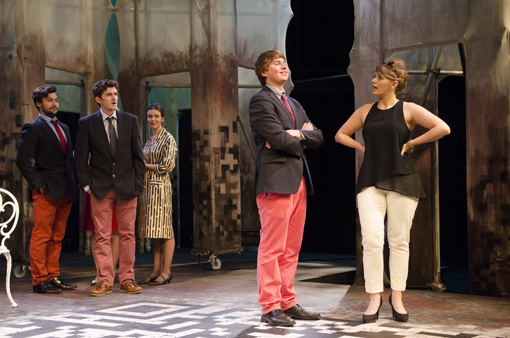Exploring Jacobean Comedy Online
We have therefore already put together a more variegated array of material than has been assembled by any similar site. But what we have so far provided is, we intend, only a beginning. In January 2014 I will be posting a detailed account, from the director’s point of view, of how the play changed for us during rehearsals, along with a director’s commentary (in conversation with my colleague Tom Cantrell) to accompany the film itself. I started rehearsals intensely sceptical about some dominant tendencies in the scholarship on the play – in particular, its frequent remoteness from the moment-by-moment volatility of Marston’s writing, and its inclination to substitute suspect moralisation for open-minded alertness to the complexity with which this provocative dramatist deploys his principal characters. One of my aims will be to direct attention to incidents largely ignored in the critical literature, but which challenged and absorbed us in rehearsal and, we hope, proved resonant in performance, and also to spotlight exchanges where the interpretative choices confronting actors are especially pregnant with alternative possibilities.

The Dutch Courtesan: Left to right, Nick Armfield (Freevill), Rory Hern (Tysefew), Emilie Smith (Putifer), Harry Whittaker (Caqueteur), Eliza Shea (Crispinella). (image: Dr Ollie Jones / University of York)
This fresh analysis, in dialogue with the video evidence, will be offered as an invitation to others to write up, for posting on the website, their own views of the play in the light of our experiment, and of the decisions about how to stage the play which our rehearsals generated. The play’s final movement, for example, brings its two main plots together in a bravura scene in the shadow of the gallows, in which two men, innocent of the crimes for which they are condemned, face execution. At the start of rehearsals, I would have been unable to predict the decisions we finally made about how to play the endings of these stories. By narrating the process by which we made these unexpected choices, we hope to stimulate a continuing online debate about this extraordinary play.
But our plans reach further. We aim to develop a twin website to the existing one, on which we will explore – via filmed rehearsal experiments and accompanying analysis and discussion – the distinctive technical and interpretative demands different leading Jacobean playwrights make upon their players, even when they are exploring similar material. This seems to us a subject of fundamental importance, which has, however, received scarcely any serious scholarly attention. The fusion of materials which the internet can accommodate, however, offers us a new way to approach this question and prompt debate about it. Our first step will be to compare plays by Ben Jonson and Thomas Middleton from this perspective. We plan to launch our explorations via a rehearsal experiment in which the actress Penelope Wilton – a brilliant Livia in the 2006 Royal Shakespeare Company production of Middleton’s Women Beware Women – will be filmed working with student actors on a Livia/Isabella scene from the play. Watch this space.
Professor Michael Cordner
 Learning on Screen
Learning on Screen